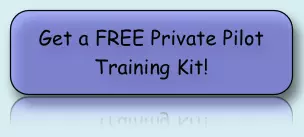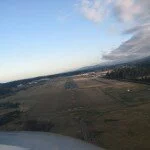Hi there! So, are you thinking of taking flight lessons? Well, I promise, it will be an experience of a lifetime! However, make sure this experience is a good one, rather than a bad one. One thing that will almost guarantee it be an awesome experience, is choosing the right CFI – Certified Flight Instructor.
This is one of the most important decisions you will make as a student pilot. Although some schools will assign you a flight instructor, if you don’t feel comfortable with him/her, you can certainly ask for another one. In fact, that’s exactly what you must do.
What do I mean by “comfortable”?
Knowing whether a certain instructor is right for you takes more than just asking questions – it takes intuition. You have to use that feeling that you get inside you.
Have you ever been driving along and suddenly felt that you were going the wrong way? There were no signs that said, “THIS IS THE WRONG WAY TO YOUR DESTINATION”, yet, you felt like you were off track. Before you see a road sign to confirm that you were going the wrong way, your intuition was already telling you this. This is what I mean by comfortable. It’s that warm and fuzzy feeling you get once you turn around and know that you’re back on the right road.
When interviewing a potential flight instructor, pay attention to your intuition. Try not to judge someone based on how professional they look (although, if they’re completely sloppy, you might want to be weary), or how tall they are, or whether they’re young or old, male or female. Instead, listen to what they say and see if you feel “expansive” or “restricted”.
What do I mean by expansive and restricted?
Here’s what I mean:
Think about something that you enjoy doing with a passion. Perhaps it’s dancing, playing video games, riding your motorcycle, or even flying. Now, think about talking to someone about this activity - you are being expansive if you get excited from talking about it, you feel more energy, your eyes are wide, you move towards the person as you talk. If, however, you feel restricted when you talk about something that you don’t like, you slump down, you feel insecure, unsure, and perhaps a bit afraid.
When interviewing flight instructors, ask them a few questions and see how their answers make you feel. Here are some questions you can ask. Remember to pay attention to what they’re saying, but also to your own body language and intuition.
Questions To Ask A Potential Flight Instructor
Why did you become a Flight Instructor?
This will tell you if he/she is there to build up flight time (at your expense) because they can’t get another job in aviation at the time, or if they have a genuine interest in giving someone the gift of flight. This does not mean that someone who is trying to build up flight time in order to move up in their flying career won’t be a good instructor, but you should be able to determine their affinity for teaching. Some instructors are not happy to have to fly with students in order to build up flight time. These types may give answers, such as, “Because I had to” or “Because that’s how you build up flight time”.
If someone became an instructor to build up flight time AND they also have an interest in teaching you, they will answer more along the lines of, “Because I wanted to continue to learn, and students have a lot to teach too” or “Because the look on someone’s face when they first solo is priceless”.
How long have you been Flight Instructing?
No matter how well-intentioned an instructor is, the first couple of students are the guinea pigs while he/she develops his/her teaching style. If you’re someone’s first student, but you feel this instructor is for you, just make sure you ask a lot of questions and keep very good track of your progress using your syllabus. Make sure you talk to other students and ask them what kind of reading their doing, what books they’re using, what type of homework they’re getting. You should ALWAYS have some type of “homework” assignment at the end of each lesson.
Describe your Teaching Style? Is it very structured or tailored to the student?
Many pilots are the “technical” types. They’re very logical and like to make decisions based on logic without relying on feelings or intuition very much. In fact, during pilot training, you will be taught NOT to trust your intuition in certain situations. If you’re more of an intuitive person or a little on the sensitive side, you may want to look for an instructor who’s not so “technical” or look for someone who has several years of experience teaching.
Some students like to figure things out as they go, they want to try out a maneuver first, while others like to be shown first, then guided through it before they try it completely on their own. Figure out what type of learner you are and look for an instructor that is willing to adapt to your learning style.
Would you say you give more compliments than critiques or the other way around?
A lot of people respond very well to positive reinforcement, while some may not like a bunch of sugar coating on bad news. The same goes in the reverse for flight instructors. Some like to point out what you’re doing wrong (not because they don’t like you, but because they’re trying to help you improve), while others get excited with you and for you whenever you do something right. What is your preference? If you know what it is, tell your flight instructor, so that they know how to teach you. They will have their own preference, but may be willing to adapt to your way of learning too.
Do you stick strictly to the syllabus? Or do you like to jump around?
Some people are more spontaneous while others are more comfortable in a routine. If you like to keep things predicable and are not too excited about things NOT going as planned, a flight instructor that likes to “wing” it with your flight lessons might not be the one for you. It’s good to maintain some structure in your flight training, and absolutely make sure you have a syllabus where you can keep track of your progress.
However, some flexibility is good too. For instance, some flight training maneuvers require you to be at an altitude of 3,000ft or above, while others require only about 1,500ft. If the clouds are at 2,500ft, but you were scheduled to practice maneuvers that require you to fly at 3,000ft, there’s no reason to cancel the flight. Instead, switch to a lesson that requires only the 1,500ft altitude, and you can still make the most out of a lesson.
Do you use a syllabus? Can I see a copy of it?
Depending on the flight school, the syllabus may be a commercial one that you can buy online or at a pilot shop, or the school could have their own. Whichever it is, make sure your CFI uses one. If he/she thinks it’s not advantageous to use one, find another instructor.
I’ve heard people talk about “stalling” an airplane. Can you tell me what that means?
Whether you do or don’t know what “stalling” an airplane means, this is a chance for you to see how the instructor teaches you something. Will they be patient with you or talk down to you? Do they talk over your head or do they use simple terminology that you can understand? Do they ask you questions to make sure you understood or do they try to brush you off with an over-simplistic answer?
Now, with all that said, keep in mind that flight instructors have a huge responsibility on their shoulders. Even after they sign you off and you get your pilot certificate, if you go and do something silly and get in trouble, or even worse, end up dead – your flight instructor is the first person the National Transportation Safety Board and the Federal Aviation Administrator will want to talk to. He/She can even have their pilot certificates suspended or revoked.
So, just because your instructor should treat you with respect and professionalism, it doesn’t mean you are off the hook from accountability. Your role as a student is to show up prepared for each lesson, study in advance, ask questions if you don’t understand something, and take notes at the end to make sure you know what to do differently next time.
Well, I hope these tips help you find the perfect flight instructor for you! Remember, if you’re taking flight lessons and you’re not having fun and feeling like you’re growing in piloting skills AND as a person, something is not right.
Now it’s your turn to share – tell me how you found your instructor and if he/she was the right match. Or, if you have a question that you’d like me to answer, email me at or leave a comment below!
Are you ready to get started? I’ve put together a FREE Private Pilot prep kit so you can hit the “ground” running. Enjoy!







